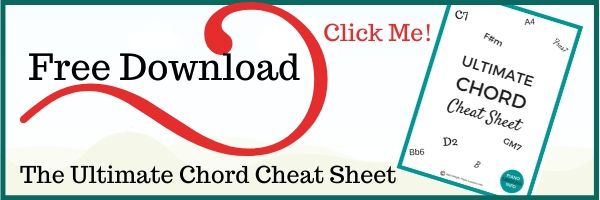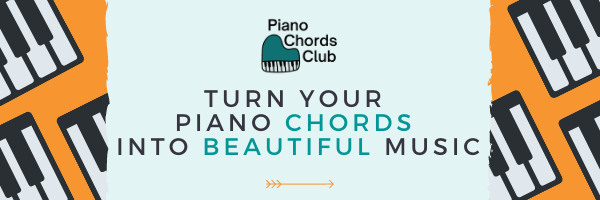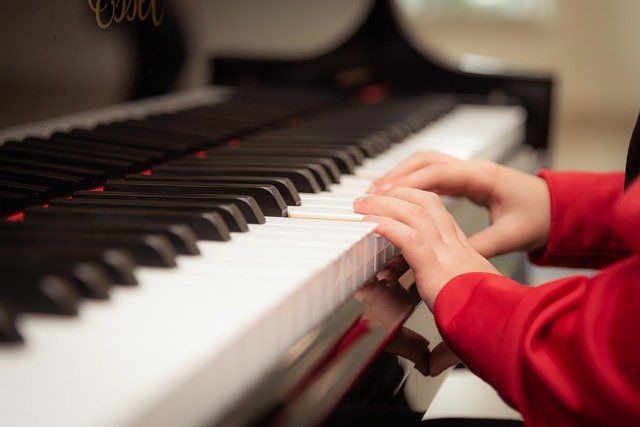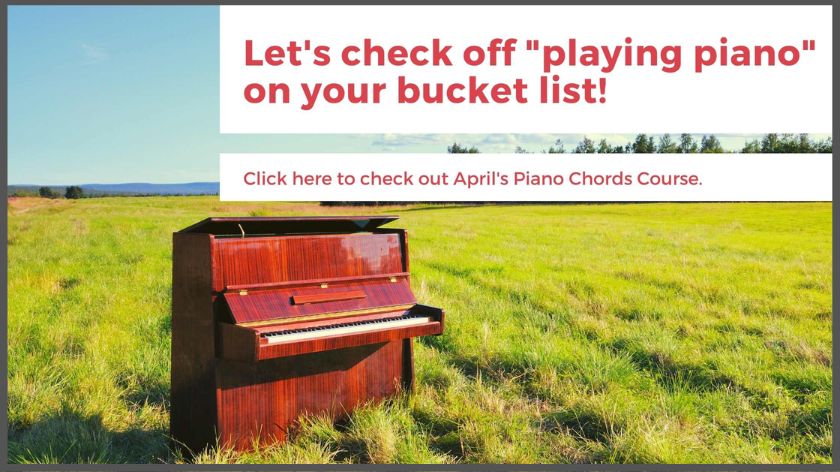How Long Should A 7 Year Old Practice Piano Daily?
Info + Strategy
Encouraging a child's musical journey can be an incredibly rewarding experience. If your child has just started lessons, you may be wondering how long should a 7 year old practice piano daily. What about a 6 year old or an 8 year old?
Finding the right balance is key to nurturing their musical growth without overwhelming them or making it seem like a chore.
So here we'll go more into how long kids should practice piano as well as how to make it happen. And all this coming for a parent and piano teacher who knows the pain of trying to get kids to practice on both ends. :)
How Long Should Piano Practice Time Be?
For a 7-year-old beginner, a daily practice duration of 10-15 minutes is a good starting point. Short, focused practice sessions are more effective than long, unfocused ones.
Aim for consistency rather than quantity, ensuring your child practices 4-5 days a week. This routine will establish a solid foundation for progress and having a routine set in place means you don't need to have that mental burden of "they really need to practice, when's it going to happen". It just happens because it's part of a routine.
For younger kids, like 6 years old, 10 minutes per day is probably enough. If they can handle more, great, but if not, that's okay too.
For older kids, 8 - 10 years old, you can go a bit longer. Start at 15 minutes and see if you can get to 20 minutes at least once per week.
Timing Practice Sessions
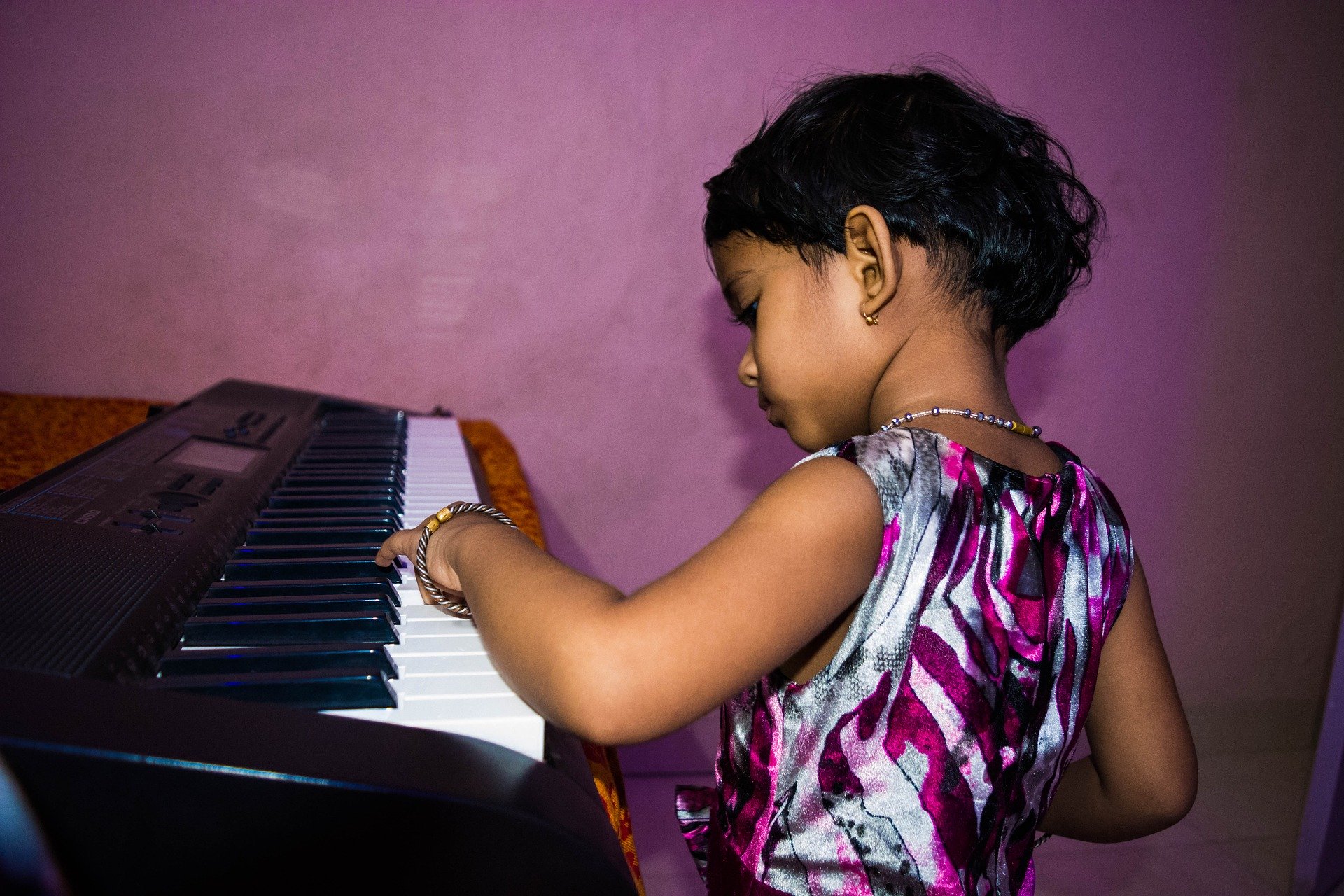
Whenever possible, encourage your child to practice immediately after their piano lesson. This helps reinforce what they learned during the lesson and strengthens their memory retention. Practicing soon after the lesson will also create a positive association between learning and practice.
Quite a number of my students have told me that they prefer to do this because it helps them during the week. So this strategy doesn't actually come from me but from them which signals to me that it's a good one.
Tip: one parent told me they sneak in a practice that their child doesn't realize by saying, "show me what you learned at piano today." And that's extra practice plus attention and positive reinforcement from parents.
How Many Days Per Week Should Kids Practice?
If you are able to encourage practice on the same day as the piano lesson, then 5 days per week is an ideal number of practice sessions to aim for.
Next best? 4 days per week.
If you can get in 4-5 days of practice at 15 minutes per day, that's a great routine to have.
Now if your child is on the more advanced side and has connected with music, gets it and enjoys it, you may need to have a longer practice time but use your discretion here.
Finding the Optimal Piano Practice Time
One of the things I've found at least somewhat effective with my students who aren't practicing much is to ask them what the best time of day is for practicing piano. And often I ask which days as well.
Having an idea in mind of when practice time should be and would work best helps to get practice happening.
Every child is different, so consider your child's daily routine and energy levels when scheduling practice time. For some children, practicing in the morning before school works best as they tend to be more focused and receptive at that time. Others may prefer practicing in the afternoon or early evening when they are relaxed and have had time to unwind.
Some like practicing on the weekend and others don't. So figure out when it'll work best for your child's and your families schedules.
Tools For Getting Kids to Practice
Creating a Practice Log
A practice log can be a great tool to track your child's progress and provide a sense of accomplishment. Being able to put a checkmark down can be really motivating for some kids.
You can create a practice log a few different ways - create a time based practice log or a song based practice log.
Time Duration Practice Log
Create a practice log in terms of 5 minute blocks. This is a great amount of time for younger kids like 6, 7 and 8 year olds.
Write down the name of the song or the dates of the week and then create little squares for the kids to check or colour in.
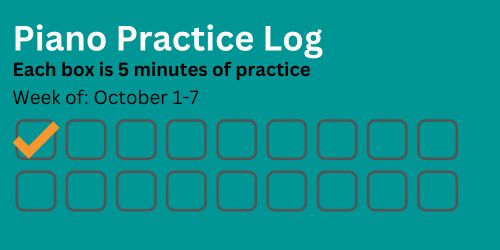
Song Practice Log
Another good type of practice log is the song practice log and this is the one I use for kids who need something extra to track practice.
I use a box with the name of the song and then about 20 little squares for the kids to fill in. They usually don't come back all filled in but it gives them something extra to aim for. Each time a student practices a song, they can colour in the box or give it a check mark.
I like to draw a little happy face or give them a sticker for any amount of boxes checked off. It's great to acknowledge them for their practice.
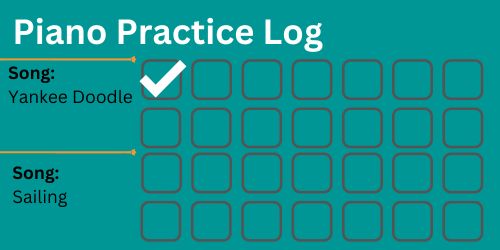
Give Kids Time To Play Around At the Piano
In addition to structured practice, encourage your child to explore the piano freely and play for enjoyment. Foster their creativity by allowing them to experiment with their own musical ideas and made-up songs.
Create an environment that celebrates practice for the sake of practice, emphasizing the joy of making music rather than solely focusing on progress and performance. Sometimes just playing around helps them to learn and enjoy what they are doing.
So How Long Should A 7 Year Old Practice Daily?
Aim for 10-15 minutes, 4 or 5 days per week.
Choose a time that's not a battle, like the morning.
Make it part of your routine.
Use a tool like a checklist if that's helpful.
And remember to give them time to play around on the piano without practicing anything in particular.
It's also worth mentioning that many parents tell me that the kids just don't practice unless made to. This is really common and I think kids aren't just going to sit down and practice without being asked as a general rule. So be involved but find a way so that it's not stressful for you or your child. If you can get to the point where it's a gentle reminder, like "it's practice time," I think that is a good balance.
And thank you for giving your child this gift of learning music.
Recent Articles
-
Piano Notes Chart
Nov 20, 23 10:21 PM
Find a piano notes chart for treble clef and bass clef notes as well as the different types of notes. -
D Chord on Piano + Diagram, How To & Theory
Oct 24, 23 12:20 AM
Learn how to play the D chord on piano with diagram, fingering, D/A, D/F# and a theory explainer. -
Diminished Piano Chords: Chart & How to Make Them
Oct 09, 23 09:23 PM
Learn the different diminished piano chords and how to make them. Here you'll find both a diminished chord chart and an explanation.
- Home
- Teaching Piano
- How Long Should A 7 Year Old Practice Piano Daily?
